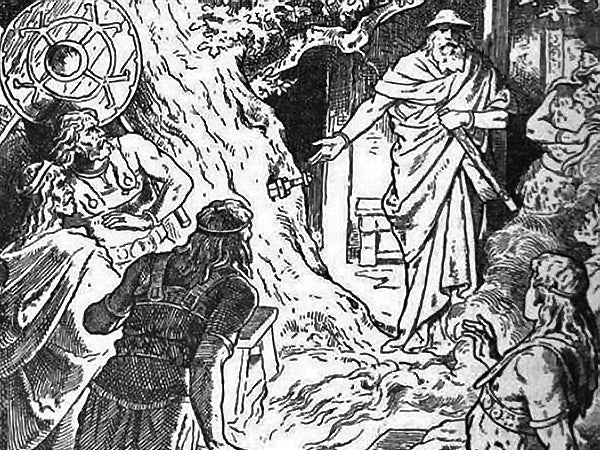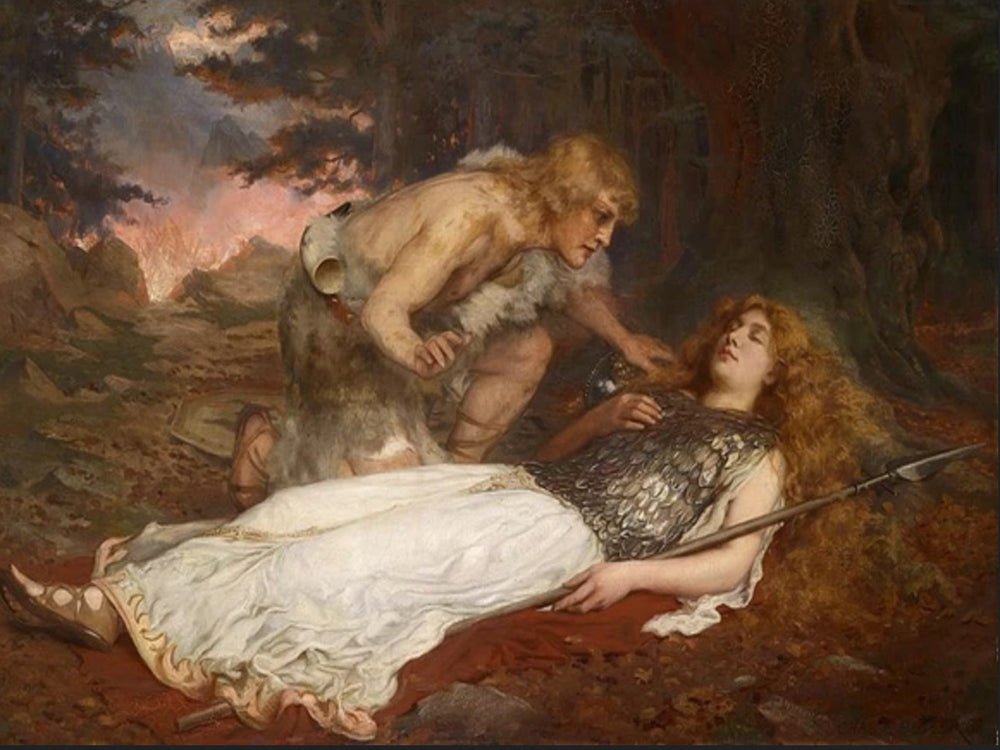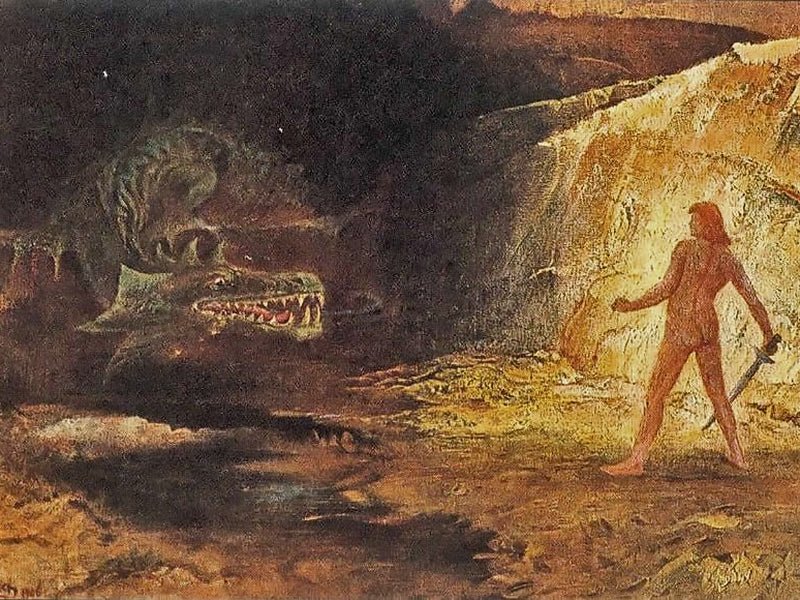'Sigurd and the Dragon' described how Sigurd killed the dragon Fafnir, thus getting for himself fame, wealth, and Andvari’s curse. But even before he met Fafnir, Sigurd had inherited a complex load of courage, fury, and grief from his dead father Sigmund.
Sigmund was the son of King Völsung of Hunaland, who was said to be descended from Odin. Sigmund had nine brothers and one sister, his twin, Signy. When King Siggeir of neighboring Gotland asked for Signy’s hand in marriage, Völsung agreed, thinking the alliance good. Signy, mistrusting Siggeir’s character, was loath to marry him, but her father insisted.

At the wedding feast a one-eyed beggar thrust a sword into the heart of the great oak tree which stood in the center of Völsung’s hall, announcing that the man who could pull it out again could have it as a gift. When the beggar disappeared, men knew him for Odin.
King Siggeir couldn’t budge the sword, but in Sigmund’s hand it slid out easily. When Sigmund refused to sell the sword to Siggeir, Siggeir swore vengeance and flung out of the hall.
Völsung refused to acknowledge that he had chosen wrongly for his daughter. When Siggeir invited his wife’s family for a visit, Völsung accepted, not turning back even when Signy warned that her husband planned an ambush.
Völsung paid for his pride with his life. He was killed in the ambush, and his sons captured and tortured. When all her other brothers were dead, Signy contrived to free her twin and send him into hiding in the wilderness until he could avenge his kinsfolk.

After bitter years of outlawry, captivity and escape, Sigmund and his son Sinfiotli burned King Siggeir’s hall. By Signy’s own contrivance this killed not only Siggeir, but also Signy and their children.

After bitter years of outlawry, captivity and escape, Sigmund and his son Sinfiotli burned King Siggeir’s hall. By Signy’s own contrivance this killed not only Siggeir, but also Signy and their children.
Sigmund returned to rule his father’s lands, and he married, but he and his wife Borghild became entangled in a blood feud between their kinfolk, and Borghild poisoned Sinfiotli. Sigmund wept bitterly and carried his dead son down to the waterside, where he met an old ferryman whom some say was Odin. Sigmund wished to depart with his dead son, but the ferryman took the corpse and poled away alone. Sigmund, returning home, banished his wife, who died soon after.

Sigmund was renowned, brave, bitter, and old when he fell in love with the wise and beautiful Princess Hjördis. Wealthy young King Lyngi also wanted Hjördis. Her father, fearing to refuse either of his daughter’s powerful suitors, left the choice to Hjördis. She chose Sigmund for his courage and his fame, and Sigmund married her with great rejoicing.
King Lyngi attacked Sigmund’s kingdom. Sigmund’s greatly outnumbered army might have managed successful guerilla warfare, but Lyngi sent a message saying that surely Sigmund would not hide, and Sigmund, proud like his father, marched his small force out openly to meet their foes—after sending Hjördis and his treasury to a hiding place in the forest.

Sigmund fought with a young man’s strength and an old warrior’s skill, and his forces were holding their own against all odds when a cloaked old man walked onto the battlefield and struck at Sigmund with his staff in the sight of both armies. When Sigmund struck back, his sword broke, and the armies knew that Odin fought against him.
The battle that followed was short and bloody. When it was over Hjördis crept out of the woods and found her dying husband, who told her to guard well the three things he had given her that Lyngi had not stolen: his treasury, the shards of his sword Gram, and the son in her womb. Hjördis fled, found refuge in King Alf’s court, and married him.
“Sigurd and the Dragon” showed the re-forging of the wonder-sword Gram and the shaping of young Sigurd under Regin’s wise but twisted tutelage. Odin also had a hand in Sigurd’s upbringing, though Sigurd did not recognize him. He helped Sigurd choose for himself the best of horses, a descendant of Odin’s own steed Sleipnir, who was the foal of Loki. And when Sigurd took up what he saw as the duty of vengeance and sailed to attack Lyngi, he stopped to pick up an old man marooned on an island in a stormy sea. The old man soothed the sea, gave Sigurd a great deal of wise advice on the art of war, and then disappeared.

Sigurd killed Lyngi, defeated his army, and returned home victorious, though the host he brought back across the sea was far smaller than the host that had departed. So, while still young, Sigurd was already battle-hardened when he went to slay the Dragon... and later stories will show what came of that.




